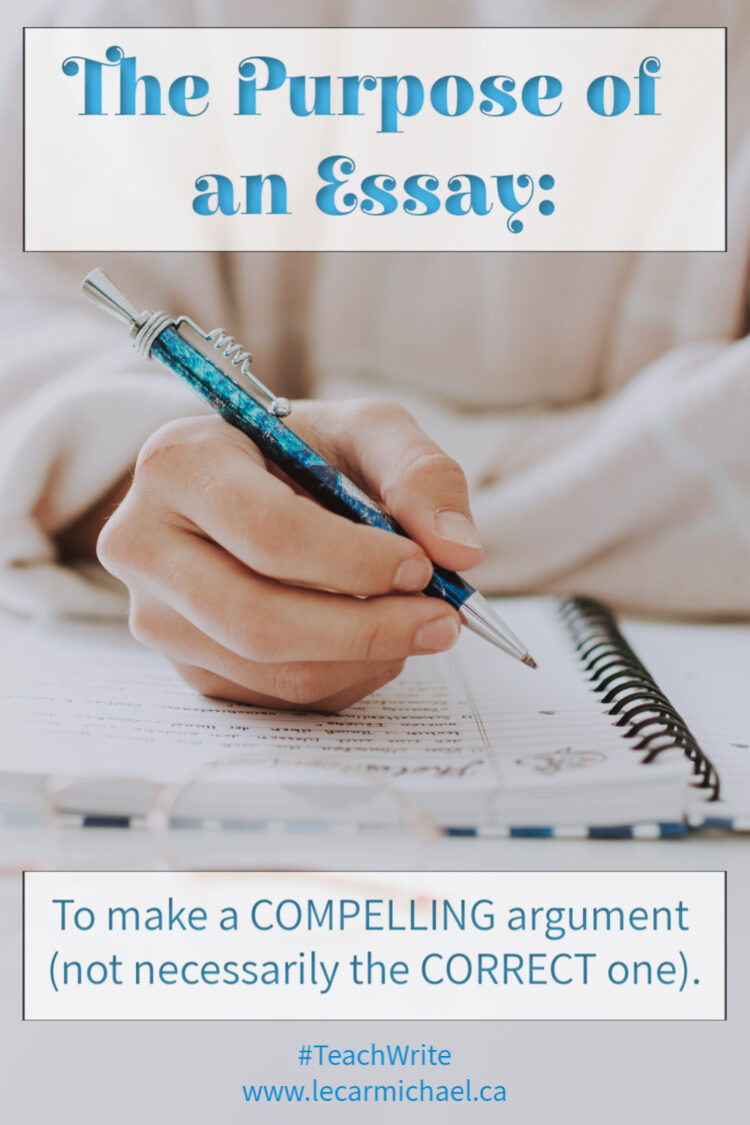 Welcome to Teach Write! This column draws on my 20 years’ experience teaching writing to kids, university students, and adult learners. It includes ideas and exercises that teachers can use in the classroom, and creative writers can use to level up their process.
Welcome to Teach Write! This column draws on my 20 years’ experience teaching writing to kids, university students, and adult learners. It includes ideas and exercises that teachers can use in the classroom, and creative writers can use to level up their process.
Happy New Year, and welcome to January, also known as “the start of a new semester.” Which means it’s a perfect time to talk about the most common form of writing assigned by university professors – the essay. Students in high school, colleges, and other institutes of higher learning will also find today’s column helpful, as we answer the question “what is an essay for?”
First, a caveat – there is more than one type of essay. If you’re in any way uncertain about what your instructor is asking you to do, find out! Trust me, getting some clarity before you start writing will save you a whole lot of time down the road. But for our purposes today, we’re going to focus on the most common type of academic essay: the argumentative essay.
As you may recall, we’ve been talking about the importance of understanding the purpose of what we’re writing before we actually start. Unlike other forms of writing, where the goal can be a bit more obscure, the purpose of the argumentative essay is right there in the name:
To make an argument.
But let’s take that one step further and ask, “What is the purpose of an argument?”
If you answered, “To convince someone that I’m right,” you get a gold star. 😀
The purpose (goal) of an essay is to convince the reader that your argument is correct. The structure of an essay is designed with this purpose in mind. In simple terms:
- We start by presenting our thesis statement – a sentence (or two) that encapsulates our argument or position on the topic at hand
- Then we present evidence that supports our argument – the proof that our position is valid
If our evidence is compelling and clearly presented, the reader will be convinced that our argument/thesis/position is, in fact, the correct one.
This is usually the point where students give me anxious looks, so let’s take a closer look at why you might be concerned:
“How am I supposed to make an argument if I don’t actually have an opinion on this topic?”
There are probably going to be times that your instructor asks you to write an essay on a topic you couldn’t care less about. Here’s the good news: it doesn’t actually matter. You have to take a stand in your paper, but that stand doesn’t have to reflect your real opinions unless you want it to. While it is usually easier to argue in favour of a position you feel strongly about, that’s not always the case. As you work on your assignment, you’ll probably find that your opinions on the topic start to crystallize. And if they change after you’ve handed in your assignment, that’s OK, too (changing your opinion as you learn more is actually a good thing). So don’t worry too much – at this point in the writing process, all you need is a place to start.
“What if I don’t know what the correct position is?”
This is a very common concern, especially for first year students, and for students in the humanities. Science-minded students who are taking required humanities courses tend to be especially concerned about the issue of correctness, because we like things to be clear cut and are very uncomfortable in the grey areas. Here’s the good news: it doesn’t actually matter. An essay is much less about finding the “one correct truth,” and much, much more about making a good argument.
That being said, for any topic, there are positions that are easily supported, and positions that are much harder to defend. Your job is to identify and present the evidence that upholds your argument, whatever that argument happens to be. That job is easier if you choose an obvious argument, but you’ll learn more if you dig a little deeper. What’s more, there is absolutely nothing that professors likes better than an interesting argument they haven’t encountered in a hundred papers before yours! So, try to worry less about getting it “right,” and think more about being creative and building a good case.
We’ll return to the argumentative essay in later columns. For now, a challenge, should you choose to accept it: next time an instructor assigns an essay, brainstorm as many positions as you can before picking one. Push yourself and don’t be afraid to contradict your own opinions or otherwise think outside the box – that’s where all the interesting stuff is, anyway!
Hey, did you know I teach writing workshops? It’s true – I work with adult writers, teachers, and students of all ages. Contact me to learn more.